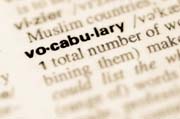 Buy a good monolingual dictionary.
Buy a good monolingual dictionary.
- Read as much English as you can. Read anything that interests you, in any format available to you. If you find news or literature difficult, try reading 'graded readers', which are simplified books.
- Select carefully the words or phrases you look up in a dictionary. It's frustrating to look up every word that you don't understand. Only look up those words that you think are important, such as:
- Words or phrases that occur often
- Words or phrases that are essential for understanding a sentence.
- You can often get the general meaning of the sentence without having to use a dictionary, so save yourself some work!
Developing your Vocabulary
Business English Tip of the Week
Latest Newsletters
Business English Tip Categories
- Monthly Quiz Archive (17)
- 商業英語考試 (54)
- 發音 (2)
- 一般英語 (22)
- Business Vocabulary (13)
- General English (8)
- Business Writing (20)




